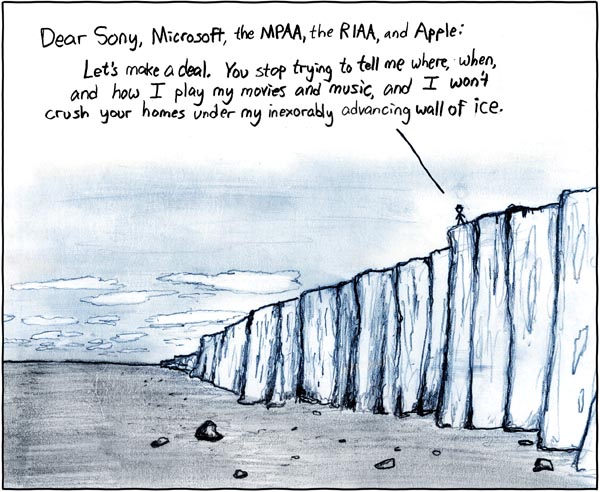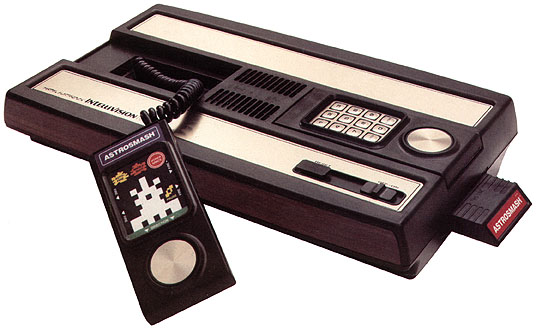It wasn’t too long ago that I remember it; the scandals appearing on the television, the advertisements that started playing, showing kids but years older than me set to the song “I Fought the Law”, busted, it seems, for sharing mp3 files over the internet. I hadn’t really much idea what all this meant at the time, or understood the severity of their offenses. What the commercials told me was “file sharing was bad”.
Well, some years later I started to use the internet much more often, and one day, I stumbled across Wikipedia, and I was astounded; a free encyclopedia, without ads, that seems to know everything about anything. I was very impressed, to say the least. However, as it turns out, things get better. I discovered the ‘edit’ button atop every page, and even came to the realization that if a page doesn’t exist, I ought create it. To this day, I help write Wikipedia, and although I’m a little less active than I was formerly (slightly retired) I clean up vandalism, fix typos, and add my knowledge where needed.
If you know me well, you’ll understand that when I get into something, I get into something. I learned as much as I could about the principle behind a wiki, and learned that it actually came from the Hawaiian wikiwiki, meaning quickly, because of how fast its articles could be edited. I also learned about how major a communal effort is needed to create a wiki, and learned about ‘community’ technology, so to speak. To this day, I’m still stunned beyond words at how Wikipedia virtually organized itself, and how it taught me something I shan’t soon forget: the principle of open source.
Open source is a tricky thing to pin down in a few words, but it primarily applies to technology, though it can extend past that. Open source is mostly a principle that deals with creation, sharing, and so much more. Wikipedia terms it as “an approach to the design, development, and distribution of software, offering practical accessibility to a software's source code.”
The reason it’s called ‘open source’ is because the ‘source code’ of a program, or all those lines of code that make a program tick- sort of like blueprints to make a building, or DNA to make an organism- are there for the taking with open source software. Thus, you can take the source and modify it to meet your needs. Not only that, but you’re encouraged to share what you’ve created with others, and collaborate on improvements. This is only the tip of the iceberg in describing open source.
But what has this to do with music, you ask? Well, as I learned about open source, and the licenses that accompany it, I realized that open source extended beyond technology, but the same principles applied just about all works, such as art, music, literature, film, and even products. Around the same time on websites such as Youtube I noticed that large companies (I won’t drop names) were starting to complain about people violating their copyrighted works. Videos were getting pulled down left, right, and center. Unauthorized audio was disabled, and people got quite angry. Now, these huge companies that provided the music were becoming the villains who took it all away.
So I decided to examine the matter a bit more closely. What was it that people could be posting that’s causing all this trouble? I took a look for myself. Turns out, people were getting creative, making top-notch music videos from television shows, movies, and anime. The problem is, however, this was in violation of existing copyright law.
These laws were put here to protect rights; suppose you created this song, it took you five whole years, but the song is incredible. You start selling copies of it, and it becomes a hit, millions of people love it. Then, some company takes the song and uses it in a commercial. You, however, receive no credit for making the song, no money from their using it, and they make billions with some product that you unwittingly sold. Yet, you receive no part of it. Copyright law is there to prevent that kind of thing from happening. It’s also there to prevent somebody from claiming your work as their own. Unfortunately, most of it wasn’t written for the participation age. Because the tools to not only create, but also to modify, share, and distribute things that were previously considered ‘professional only’ are now in the hands of ordinary people. Thus, common people have the tools to create things, the platforms to distribute them, and the ability to collaboratively improve upon existing works. All of this is done, yet with a different principle behind it, not in an attempt to steal but innocently trying to share something they created, profiting from feedback, not sales. Unfortunately, these massive companies are incapable of understanding what’s behind this sense of community, partly because of fear they’ll be ripped off, partly because they’re afraid they’ll be taken advantage of by their competitors, and in some cases, partly out of sheer greed. As I’ve brought out before, the intentions of the ‘violators’ is quite innocent, if not noble. Thus, something needs to happen. Some of the major arguments media conglomerates have against people doing these things are:
- It’s illegal. Well, that’s true, however, it’s not an intentional violation of the law, perhaps some wiggle room could be provided? Remember these aren’t people with ill intent.
- The people who directed, edited, and toiled over this content are receiving nothing. Yes, but how often, exactly, are they receiving something? Suppose a music video is made, and fancy special effects are used, a load of people edit it, contribute towards it, etc. Suppose now that somebody wants to use portions of that video somewhere. The licensing fees are usually rather largish, yet, a pretty good chunk of the people don’t get anything from those licensing fees.
- You’re crushing the musicians you supposedly love! Don’t you know that this music is their livelihood? Nope. Just like those people who make the music videos, artists don’t make much off the sales of their music, but from concerts and merchandise. What does the record company do, exactly? According to Wikipedia, the record label is “the company that manages such brands and trademarks, coordinates the production, manufacture, distribution, marketing and promotion, and enforcement of copyright protection of sound recordings and music videos; conducts talent scouting and development of new artists ("artists and repertoire" or A&R); and maintains contracts with recording artists and their managers.”
Yet, music can be produced at home. Manufacture isn’t necessarily necessary, since an mp3 can be download free, distribution can be free, and if you’re good, fans will come to you. Marketing, again, can be free, by sharing your music with others online. All it takes is a simple link to a file in a few places, and maybe even a few ads at a minimal price. Regarding protecting copyright, one can simply ‘copyleft’, using licenses that would protect their rights without the self-villanization of refusing to share. Thus, an artist can allow others to create music videos, make funky dance-remixes and forward your songs to friends without breaking the law, at the same time promoting your music. How would you make money, you ask? Like everybody else, from your concerts. It’s already proved quite effective, and the cost of renting out a venue can be offset by the sales of tickets. The internet is now a superior platform to the record label. The only way for record companies to survive is for them to adapt, and to continue with distribution. If they change their models, freeing up music, and doing their jobs to protect the rights of artists- without smothering them. Record companies ought embrace copyleft licenses and by all means encourage the use of them. They should be producing CDs for people who will buy them, and making sales off the price of physical goods, not the music itself.
Thus, by allowing people to use songs freely (within the bounds of noncommercial usage), music videos, remixes, etc., can be created by communities, the end result being good for all parties involved. Regarding commercial use, it should be dealt with as it always has been- licensing fees, using the record company to ensure that the artist receives a good deal.
Yes, this is a system that can work, but how? The first step is to share this article with friends, family, co-workers, etc. Then, try to educate yourself on copyleft, open source, and the like to understand the motivation behind it. Make sure that you send a copy of this article to your local record company, possibly by e-mail, but preferably a hard, printed copy, to show that you mean business. Another recommendation is to listen to ‘open source’ music, I’ve provided a couple sources in the bibliography.
Lastly, don’t be afraid to participate. Make music and share it around, you never know who will like it!
However, in order to get them to change, I do not recommend violating copyright law. This, of course is illegal, and something you really shouldn’t do. What is the solution, them? Share around copyleft content. You’re allowed to. Peer-to-peer, or p2p file sharing has been given a bad reputation by the mass media, mostly because it is abused to violate copyright, but also partly because it can draw attention away from the mass media itself, towards peer created content. For the first time, we don’t need to be dependant on a few people for creating quality content- meaning that the voice of the people can truly ring out.
Bibliography
Here, you can find a proper definition of open source technology
More information about the use of p2p file sharing
An online radio website that plays music according to your taste, based on music you know you like- connecting people with new musicians.
An open source video game console
Open Source Music in every genre
More open source music, primarily samples to make remixes from
Copyleft licenses in plain old English that you can feel free to use
This is my blog, where I publish stories, poems, articles, and book reviews
Wikinomics: How Mass Collaboration Changes Everything, by Don Tapscott and Anthony D. Williams
An excellent book that describes just how mass collaboration and peer production can be successfully employed in business environments.
This article is licensed under the Creative Commons Attribution-Noncommercial-Share Alike 3.0 United States License. In short, you’re free to take this article and edit it to your hearts content, so long as you credit the author Jourdan Cameron. For commercial usage, however, you must contact the author: bettafishvideos@gmail.com

Musical Freedom by Jourdan Cameron is licensed under a Creative Commons Attribution-Noncommercial-Share Alike 3.0 United States License.




